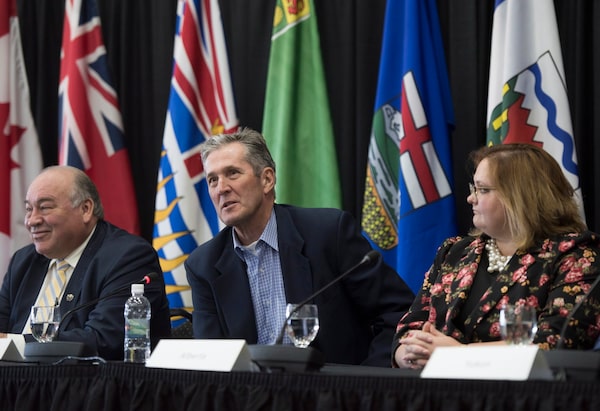
Manitoba Premier Brian Pallister fields questions from media at the Western Premiers' Conference in Yellowknife on May 23, 2018.Pat Kane/The Canadian Press
Western Canada’s premiers are calling on Ottawa to do more to help their provinces enforce drug-impaired driving laws after the legalization of marijuana this year.
A final communiqué issued on Wednesday at the western premiers meeting in Yellowknife also urged the federal government to expedite the approval of a saliva-screening device so police forces across the country can procure the equipment and train their officers accordingly.
“With respect to cannabis, we have just weeks until the federal government legalizes a substance that has never been legal before, and they don’t have any idea about saliva-screening tests that are going to be done, they haven’t approved devices yet,” Manitoba Premier Brian Pallister, among the most vocal critics of the legalization timeline, told reporters. “Our police are supposed to be stopping stoned drivers on the road and they don’t know how they are going to test them.
“We have young men in this country who think they drive better stoned right now. They are going to put their lives at risk and they are going to put other people’s lives at risk.”
In the next couple of weeks, the Senate is poised to approve Bill C-45 to legalize cannabis and Bill C-46, which creates new drug-impaired driving offences.
But Ottawa has signalled that by the time prohibition is expected to end this summer, it still will not have vetted and approved a device to screen drivers on the scene for THC – the psychoactive compound found in cannabis products.
Instead, enforcement will be handled by the more than 13,000 officers across the country trained in field sobriety testing and another 743 who have become drug-recognition experts, according to Scott Bardsley, a spokesman for Public Safety Minister Ralph Goodale.
“Testing for drug-impaired driving is not dependent on the availability of drug screeners,” he said in a statement e-mailed on Wednesday.
His statement also said Ottawa has launched a “Don’t Drive High” public awareness campaign and has invested $274-million to support policing and border efforts, with the provinces and territories able to access as much as $81-million of those funds over the next five years.
The Canadian Centre on Substance Use and Addiction estimated in 2009 that as many as 2,000 drug-recognition experts would be needed across the country to meet demand. In 2008, the Canadian Association of Chiefs of Police estimated that Canada would need 3,000 of these specialized officers to meet international standards.
Kyla Lee, a Vancouver-based lawyer who specializes in impaired-driving cases, said Canadian police officers are at least two years out from being able to use the saliva-screening devices on the road, noting that Public Safety Canada’s continuing approval and purchasing process will be followed by the RCMP’s own rigorous system of reviewing such equipment. Then each device will have to be calibrated to the impairment limits set by each province, she said, and thousands of officers will have to be trained to use the new instruments. By comparison, when police forces adopted a new type of breathalyzer, the rollout took about 18 months, she said.
Still, she said the existing regime for catching stoned drivers through field sobriety tests and drug-recognition experts appears to be working fine.
“There’s been no numbers that the government has been saying, ‘This many people every year have been killed by drug-impaired drivers and it’s a crisis,’ ” she said.
With a report from Justine Hunter in Victoria
 Mike Hager
Mike Hager